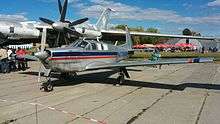Mooney M22 Mustang
| M22 Mustang | |
|---|---|
 | |
| The second Mooney M22 Mustang displayed at the Paris Air Show in June 1967 after flying nonstop from New York in 13 hours 10 minutes | |
| Role | Light aircraft |
| National origin | United States of America |
| Manufacturer | Mooney Aircraft Company |
| First flight | September 24, 1964 |
| Produced | 1965-1970 |
| Number built | 36 |
| Developed from | Mooney M20 |

The Mooney M22 Mustang is the first attempt at a pressurized single engine aircraft by the Mooney Aircraft Company of the United States.
Development
The Mustang was developed to be a top-of-the-line model to supplement Mooney's successful Mooney M20 high-performance light aircraft. It is a five-seat pressurised single-engined aircraft with a wider and longer fuselage than the M20E Super 21 and a taller fin and leading edge fillet.[1] It is a low-winged monoplane with a retractable nosewheel undercarriage, with a similar wing to that used on Mooney's earlier M20 Ranger.
The first prototype flew on September 24, 1964, with the type being certified on September 26, 1966.[2] First deliveries commenced in 1965, continuing until 1970. 36 aircraft were completed before the line was closed.[3] It was produced and sold at a loss, which contributed to the bankruptcy of Mooney.[4]
The "Mark 22" name had previously been applied to a 1957 Mooney M20 experimental aircraft built with twin engines, a nose cone, and an enlarged tail surface. That aircraft did not go into production.[5]
Operational history
The Model 22, although produced in fairly small numbers, has been operated by private and commercial owners in several countries including the United States and Australia. Its Garrett AiResearch cabin pressurisation system gives the equivalent of 11,000 ft at the aircraft's operational ceiling of 24,000 ft.[6] As a demonstration of its high performance, the second production aircraft was flown non-stop from New York to the Paris Air Show in June 1967, the flight taking 13 hours 10 minutes. The achievement is recorded on the display board in the accompanying photograph. The aircraft had been fitted with an extra fuel tank for the flight. In 2001, 24 aircraft remained in service.[7]
Specifications (M22)
Data from Jane's All The World's Aircraft 1969-70 [8]
General characteristics
- Crew: one
- Capacity: 4 passengers
- Length: 27 ft 0 in (8.23 m)
- Wingspan: 35 ft 0 in (10.67 m)
- Height: 9 ft 10 in (3.00 m)
- Wing area: 167 ft² (15.5 m²)
- Empty weight: 2,440 lb (1,106 kg)
- Max. takeoff weight: 3,680 lb (1,670 kg)
- Powerplant: 1 × Lycoming TIO-541-A1A six-cylinder air-cooled horizontally opposed engine, 310 hp (231 kW)
Performance
- Maximum speed: 223 knots (256 mph, 412 km/h)
- Cruise speed: 186 knots (214 mph, 344 km/h) (normal cruise - 65% power)
- Stall speed: 58 knots (67 mph, 108 km/h)
- Range: 1,298 nm (1,493 mi, 2,402 km)
- Service ceiling: 24,000 ft (7,300 m)
- Rate of climb: 1,125 ft/min (5.7 m/s)
Notes
References
- Green, William and Pollinger, Gerald. The Aircraft of the World. 1965. Macdonald & Co. (Publishers) Ltd.
- Simpson, Rod. Airlife's World Aircraft. Airlife Publishing Ltd. 2001. ISBN 1-84037-115-3.
- Simpson, Rod. The General Aviation handbook. Midland Publishing. 2005. ISBN 1-85780-222-5
- Taylor, John W.R. Jane's All The World's Aircraft 1969-70. London: Jane's Yearbooks, 1969.